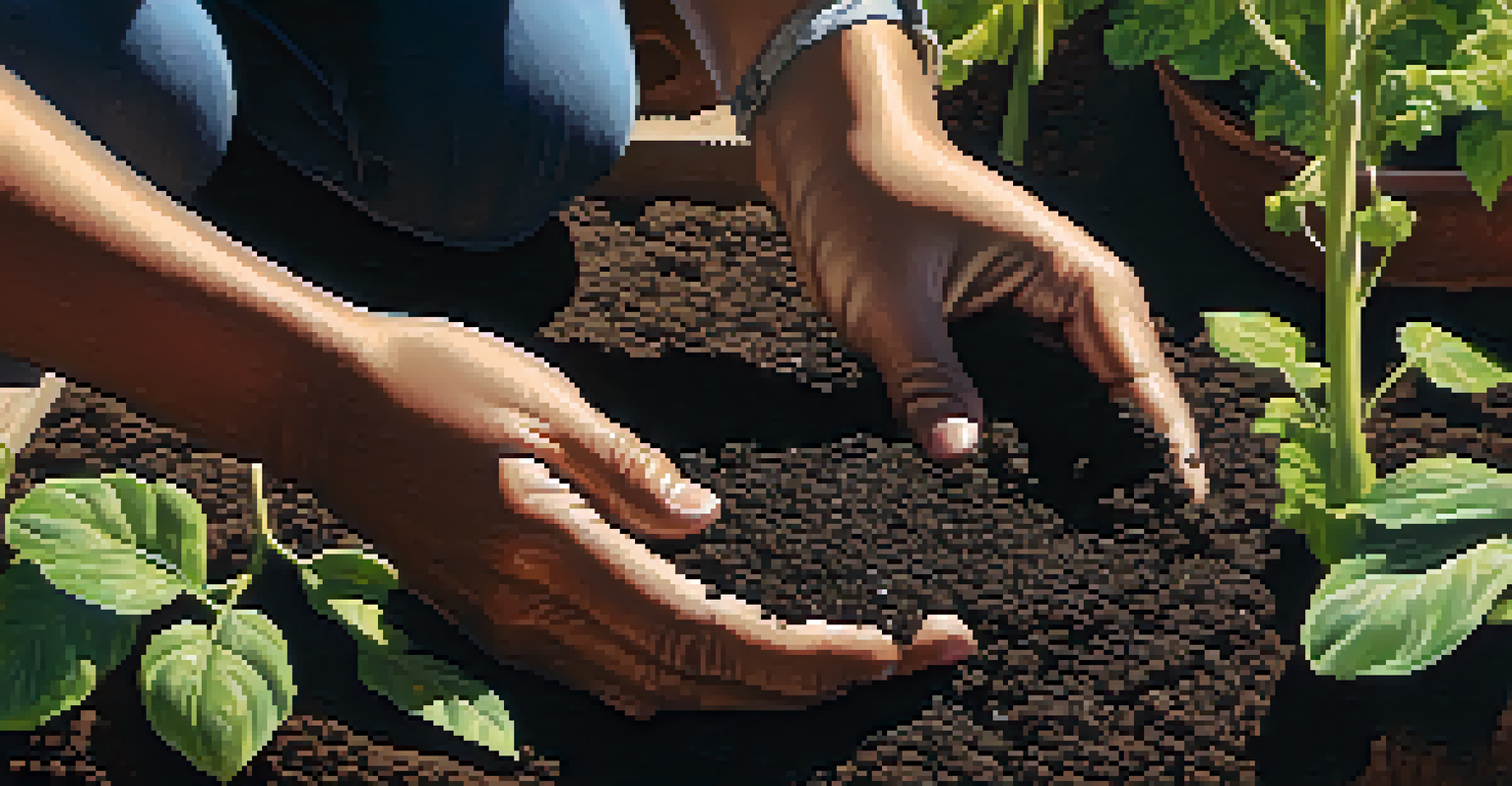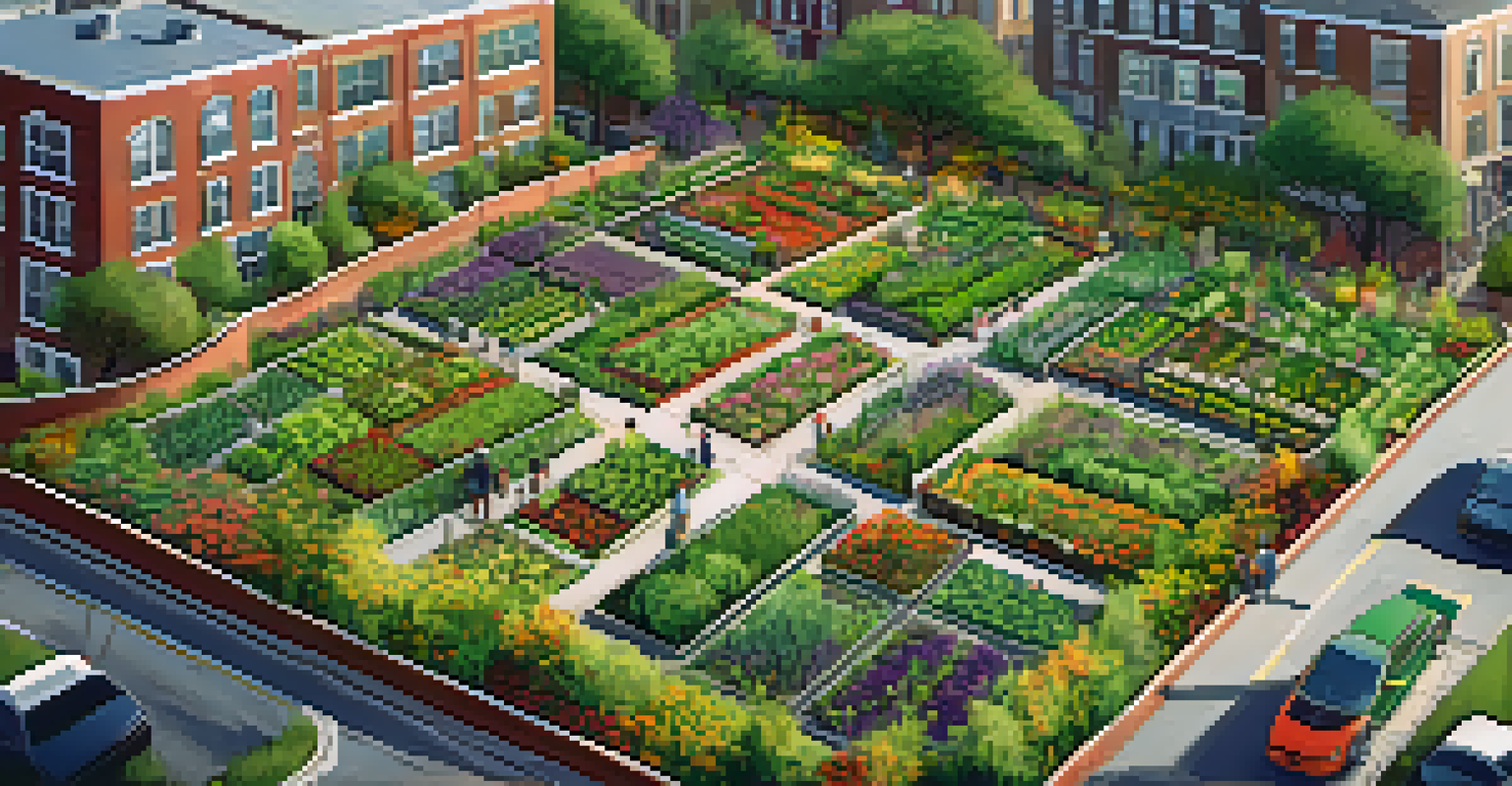Community Gardens: Growing Sustainability in Detroit Neighborhoods

The Rise of Community Gardens in Detroit
In recent years, community gardens have blossomed in Detroit, transforming vacant lots into green spaces. These gardens are not just about growing food; they’re about cultivating community spirit and resilience. As residents come together to tend to these gardens, they forge connections that help rebuild neighborhoods.
The best way to find yourself is to lose yourself in the service of others.
Detroit’s history of industrial decline left many areas with abandoned properties, but community gardens offer a hopeful remedy. They provide a solution to food deserts, allowing residents access to fresh, healthy produce. This shift towards local food production is a significant step toward self-sufficiency and sustainability for the community.
Moreover, community gardens serve as educational hubs, where people of all ages can learn about gardening, nutrition, and environmental stewardship. Workshops and events often accompany these gardens, fostering a culture of learning and collaboration. This knowledge-sharing is crucial as it empowers individuals to take charge of their health and environment.
Enhancing Food Security Through Local Gardening
Food security is a pressing issue in many Detroit neighborhoods, where grocery stores are few and far between. Community gardens play a pivotal role in addressing this challenge by providing residents with direct access to fresh fruits and vegetables. By growing their own food, families can reduce their reliance on processed items and improve their diets.

Additionally, these gardens often operate on a shared basis, meaning that everyone can contribute and benefit from the harvest. This collective effort not only ensures that food is available but also reduces waste, as excess produce can be shared among neighbors. It creates a sense of abundance that helps counter the scarcity many residents feel.
Community Gardens Foster Unity
These gardens create connections among residents, enhancing community spirit and social ties.
Local gardening initiatives also encourage the use of sustainable practices, such as composting and organic growing methods. These practices not only yield healthier produce but also enrich the soil and improve local biodiversity. In this way, community gardens are not just about food; they’re about nurturing the environment for future generations.
Building Community Through Shared Gardening Spaces
One of the most beautiful aspects of community gardens is their ability to bring people together. Neighbors who may have never interacted before find common ground in their shared love for gardening. This sense of community fosters friendships and strengthens social ties, which are essential for a thriving neighborhood.
We do not inherit the earth from our ancestors; we borrow it from our children.
As residents gather to plant, weed, and harvest, they share stories, skills, and resources. This interaction helps to break down barriers and build trust among diverse groups. In many cases, these gardens become the heart of the neighborhood, hosting events and gatherings that further unite residents.
Additionally, community gardens often invite collaboration with local organizations and schools. These partnerships enhance the garden's impact, providing educational resources and support for sustainability initiatives. By working together, the community amplifies its voice and can advocate for further improvements in their environment.
Environmental Benefits of Community Gardening
Community gardens are more than just food sources; they are vital for environmental sustainability. By converting vacant lots into green spaces, they help combat urban heat and improve air quality. Plants absorb carbon dioxide and release oxygen, contributing to a healthier urban ecosystem.
Moreover, these gardens promote biodiversity by creating habitats for various species, including pollinators like bees and butterflies. The more diverse the plant life, the more resilient the ecosystem becomes. This diversity is crucial in urban settings, where natural habitats are often limited.
Local Gardening Boosts Food Security
Community gardens provide direct access to fresh produce, addressing food deserts in Detroit neighborhoods.
Additionally, community gardens encourage responsible water use through practices like rainwater harvesting and mulching. These methods not only conserve water but also reduce runoff and erosion. Engaging in sustainable gardening practices helps the community to be stewards of their environment, benefiting both people and the planet.
Empowering Individuals Through Gardening Skills
Community gardens empower individuals by teaching them valuable gardening skills. Participants learn how to plant, maintain, and harvest crops, fostering a sense of accomplishment. These skills can be applied at home, encouraging families to start their own gardens and promote healthy eating habits.
Furthermore, gardening instills a sense of responsibility and commitment. Participants learn about the importance of nurturing plants and the environment, which can translate into broader life skills. This empowerment extends beyond the garden, as individuals gain confidence in their abilities to make positive changes in their lives.
Workshops often accompany community gardens, focusing on topics like composting, pest management, and cooking with fresh produce. By equipping residents with knowledge, these initiatives encourage a culture of sustainability. This newfound awareness inspires individuals to advocate for environmental and social change in their communities.
The Role of Local Organizations in Community Gardens
Local organizations play a crucial role in the success of community gardens across Detroit. They provide resources, funding, and expertise to help establish and maintain these green spaces. Their support ensures that gardens are sustainable and can thrive long-term, benefiting the community.
Many organizations also facilitate training programs and workshops, connecting residents with gardening experts. This educational component is vital for building skills and confidence among participants. It fosters a sense of ownership and pride in the garden, encouraging ongoing involvement and care.
Environmental Benefits of Gardening
By promoting biodiversity and sustainable practices, community gardens contribute to a healthier urban ecosystem.
Additionally, these organizations often collaborate with schools and other community groups to broaden the impact of gardening initiatives. By creating networks of support, they help to ensure that community gardens are not just isolated projects but integral parts of the neighborhood’s fabric.
Future of Community Gardens in Detroit
The future of community gardens in Detroit looks promising as more residents recognize their benefits. As urban agriculture continues to gain momentum, there’s a growing interest in transforming underutilized spaces into productive gardens. This trend not only supports food security but also enhances community resilience.
Furthermore, as awareness of environmental issues rises, community gardens are becoming essential in promoting sustainability. They serve as models for eco-friendly practices, inspiring other cities to adopt similar initiatives. This ripple effect can lead to a broader shift towards sustainable living in urban areas.

Ultimately, the success of community gardens relies on continued community engagement and support from local organizations. By fostering a culture of collaboration and sustainability, Detroit can ensure that these gardens flourish for years to come, enriching the lives of residents and the environment alike.